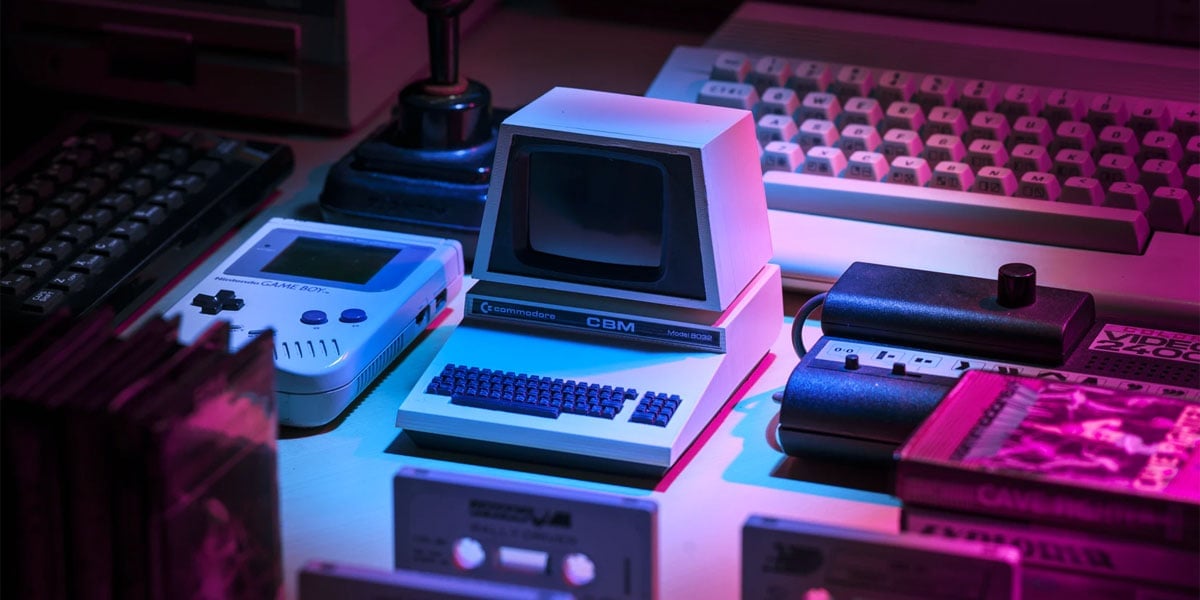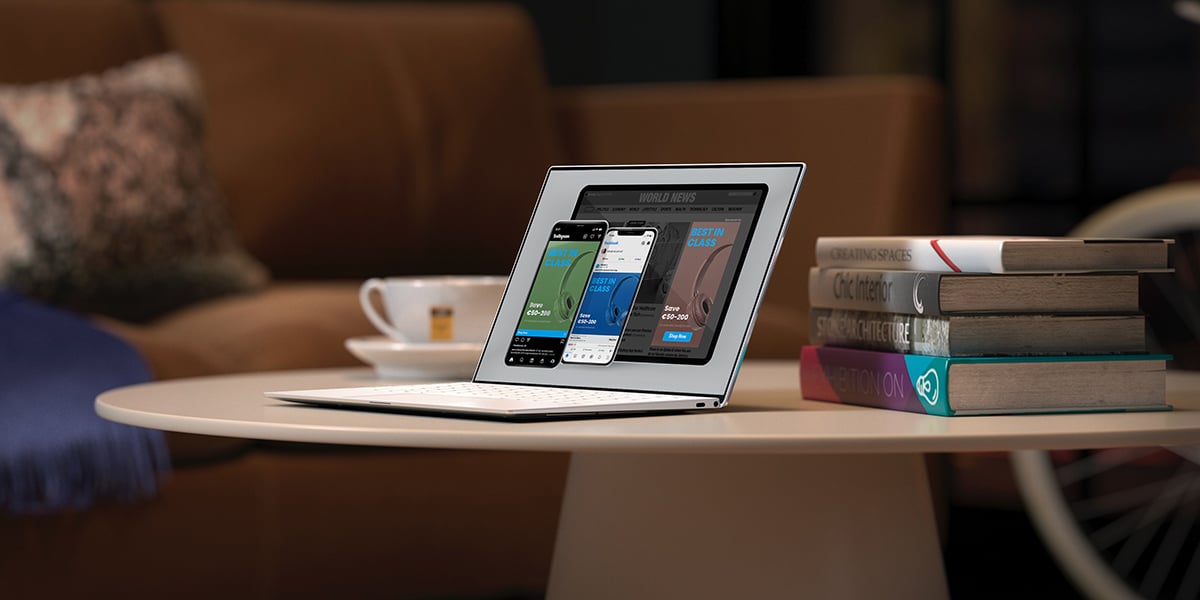The popularity of gaming – and with it the importance of gaming advertising campaigns – is soaring.
As a result of the global pandemic, an increasing number of people are turning to virtual worlds for entertainment, education and simple escapism. With popularity surging, gaming advertising, esports and gaming display advertising will play an even bigger role in getting the right message in front of the right people – at speed and scale.
In this article, we’ll take a look at the best gaming advertising campaigns, what makes them stand out, and what we can learn from them. Plus, what the future of gaming holds and why creativity, scalability, control and speed will be key.
It will include:
- The current state of gaming advertising
- “Sega does what Nintendon’t”
- Double Life
- Life is Short Play More
- “It’s a very, very mad world.”
- Believe
- Kevin Butler
- “To Michael”
- Stepping into the future of gaming advertising campaigns
- Essential strategy: production automation for gaming
The current state of gaming advertising
Before 2020, the gaming industry was already seeing, on average, a 9% year on year growth. COVID-19 accelerated this growth. So much so that the industry’s revenue is expected to grow by a third before 2023 and will be worth in excess of $200 billion.
From blockbuster ads and $million integrated campaigns through to in-game advertising and gaming display advertising, gaming advertising is big business. For every power-up and boss fight win there’s a slew of game overs that leave the audience reaching for the reset button.
Gamers are everywhere – even if they don’t realise it. Forget the days of gaming being the sole domain of people hiding away in a dark room for days frantically trying to level-up on World of Warcraft. Gaming is now part of the mainstream thanks to mobile tech and the popularity of games like Animal Crossing, Wordscapes and FarmVille.
Gamers are an engaged, diverse and growing audience. But what’s the best way to reach them through advertising? Let’s look through the stand-out gaming campaigns ever produced and what we can learn from them.
Here’s our take on the best of all time:
1. “Sega does what Nintendon’t”
Gaming’s first big acceleration into popular, mainstream culture happened in the late ‘80s and early ‘90s. It was defined by the rivalry by the two titans of the industry; Sega and Nintendo. The original NES – complete with everyone’s favourite Italian plumber, Super Mario – wiped the floor, in terms of sales, with Sega’s Master System.
Sega knew they needed a character to compete with Mario and they knew they had to push boundaries. Enter Sonic the Hedgehog.
The whirling, jumping, running, blue blur and the 16-bit graphics of Sega’s Mega Drive (Genesis in the US) left the 8-bit NES and Mario for dust, leading to Sega’s classic gaming advertising campaign line: “Sega does what Nintendon’t” and an ad campaign with cameos from cultural icons like Michael Jackson and Joe Montana.
2. Double Life
While the early ‘90s were dominated by the battle between Sega and Nintendo, the middle of the decade saw a new player enter the scene, one that would revolutionise the industry.
Sony were best known for their Walkmens and camcorders. They weren’t even considered rivals to the dominance of Sega and Nintendo. But the Playstation changed everything. And its launch came with one of the best ads ever produced – Double Life.
Even now the line: “I have commanded armies…and conquered worlds” still sends shivers down the spine of seasoned gamers. When it comes to building anticipation, crafting a diverse story and encapsulating a moment in time so perfectly, very few ads do it better.
3. Life is Short, Play More
Despite the N64 from Nintendo, it was Sony who would dominate the latter part of the decade, cementing their status as the market leader in 2000 with the launch of the PS2.
It would take budget, innovation and a point of difference for anyone to compete with them. It was Microsoft that had all of these. Not only did the Xbox arrive with Halo and the Masterchief, but it also came complete with controversy (there’s no such thing as bad publicity in gaming advertising campaigns remember?).
The ad, Life is Short Play More shows a baby being born, flying through the air, rapidly ageing before crashing into a grave. It was one of the earliest iterations of a viral video. Before it was released, it was shared internally at Microsoft via email. The file size has to be less than 2mb for it to send!
The email was shared over a million times – small numbers by today’s figures but huge at the time. This response inspired the team behind it to put it on TV. The ad immediately attracted a host of complaints and was subsequently banned – cementing its legacy and infamy.
4. “It’s a very, very mad world.”
The trailer for Gears of War on the Xbox was one of the very first ad campaigns to tap into the inherent power of human emotion. Set to Gary Jules’ cover of the Tears For Fears song Mad World from Donnie Darko, the trailer is a beautiful juxtaposition of melancholy and action, brought to life by sublime lighting and jaw-dropping (at the time) graphics. It changed everything for video game trailers and advertising.
5. Believe
Sticking with Xbox, the ad campaign for Halo 3 in 2007 was a defining moment for gaming advertising. Not only did the ad feed the hype machine already buzzing around the release of the title, it built a whole world extending beyond the game.
The buzz it generated was so big that every media outlet wanted to cover it. As storytelling in an ad campaign goes, it’s one of the finest examples. The ‘shorts’ to accompany the official trailers were directed by Neill Blomkamp and were the first to depict the Halo universe in a live setting.
They were followed up by the Believe campaign. This campaign had live-action elderly ‘war’ veterans and a huge diorama depicting the final battle that stretched over 1,200 feet. It set a new benchmark for game advertising.
6. Kevin Butler
Instead of trying to compete with Microsoft’s big budget productions and lavish thrills, Sony took a new tack in 2009. Kevin Butler became the face of their (downright hilarious) It Does Everything gaming advertising campaign. It worked a charm.
The ads were self-aware and self-deferential with huge crossover appeal. Not only were they well received by fans, they succeeded in boosting Sony’s sales of their new PS3 model. The campaign extended even further when Kevin Butler appeared in person at E3, one of the world’s biggest gaming events.
7. “To Michael!”
In 2011, Sony continued to push the boundaries with its Long Live Play campaign. The jewel in the crown was the character commercial that featured live action versions of iconic video game characters.
From Nathan Drake and Kratos through to the soldiers from Omaha Beach, together they raise a toast to Michael. And who is Micheal? The gamer who got them through their toughest times. The ad works so well because the hero isn’t the characters from the game, it’s the gamer and their story is the one that matters.
Stepping into the future of gaming advertising campaigns
Fast forward to the end of 2020 and the future of gaming is laid bare in The Edge, one of Sony’s ads for the Play Had No Limits campaign launching the PS5. With themes of exploration, innovation and (literally) stepping into the unknown, it paints a vivid picture of the future of gaming – one born from creativity and connection.
And this is where the success of gaming advertising lies.
All of the campaigns featured above have creativity at heart. They push boundaries. They do things differently. Yet – ultimately – they create a connection and elicit an emotional response in the viewer.
This response is born out of storytelling. As we enter a new age of gaming, where it’s increasingly integrated with our day to day lives and more connected than ever before, the best campaigns will need to use AI and automation to unleash creativity – and to make sure they are seen on the right channels, at the right time, by the right people.
Essential strategy: production automation for gaming
One of the biggest challenges in the gaming industry is cutting through the noise and being heard. It’s a huge space (especially with the explosion of mobile gaming) with fierce competition.
Very few businesses have the budgets of Sony and Microsoft so speed and scalability are of the essence. And when they are combined with creativity and control, well, then the magic can really happen.
This is where a Creative Management Platform (CMP) comes into its own. Creative production can now be automated and scaled! Go from a single master creative to an entire campaign across all formats and channels (including video and social) in minutes. Not only is it a game-changer for creativity, it saves both time and money.
Ads can be optimised, tailored and tested without the need for coding and the messaging can be personalised, at scale, to your audience. This gives you the power and control to replace generic ads with user specific ads – whether that’s copy, images or video.
According to Evergage, 88% of marketers say customers now expect an experience that’s personalised to them. When you have the right data you can pair it with the right creative and put your personalised ads in front of the right gamers. Personalised ads for gaming have the potential to be both console and game specific. This means you can make one-to-one personalisation, at scale, a reality.
Conclusion
As we saw in the examples above, it’s the ability to capture the hearts and minds of your viewers which makes you stay in their memories. The more tailored your ads are to each viewer, the better chance you have of doing this and, ultimately converting them.
For advertising to be successful, it has to have creativity at its heart. That’s why using tech – and a solution like a CMP – in the right way is essential. They can enhance the creative process while at the same time removing unnecessary distractions. And when you have full creative control over your gaming advertising, you can create brilliant campaigns that resonate with your audience and deliver results.
If you want to find out more about how a CMP like Bannerflow can help power your digital advertising in 2020 and beyond, then get in touch for a demo and see the future unfold before your eyes.






